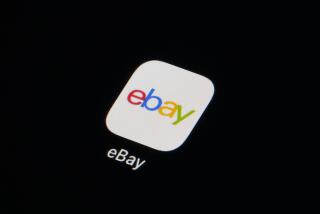Don’t Want the Web to Do Your Spouse’s Bidding?
- Share via
Forget pornography, violence and foul language. Thanks to the proliferation of electronic commerce, the role of Internet filtering software has expanded to block Web sites that pose an even greater danger: enticing people to part with their money.
Online auction sites such as EBay are the newest targets of companies that make filtering software. The filtering companies say they are merely responding to consumer demand.
“We got a comment from some lady saying, ‘My husband’s got auction fever and he’s bidding on stuff all day long,’ ” said Brian Milburn, president of Solid Oak Software, the Santa Barbara firm that makes the CyberSitter Web filter. “She asked if CyberSitter could be made so that he can’t bid over $25. We’ve had at least 20 or 30 requests to keep people out of auction sites, so we added an auction filter.”
Filtering software was originally developed to shield children from inappropriate and possibly dangerous material on the Web. Then employers started using it to limit workers’ recreational Web surfing on company time--checking sports scores, playing online games, tracking the stock market or otherwise distracting themselves from their job.
“The biggest issue is productivity,” said Alexandra Salomon, director of content services for Surfwatch Software, a division of Spyglass in Los Gatos, Calif., that makes filtering software. Think of it as the digital equivalent of blocking access to 900 numbers on company phones.
The new auction filters are designed to do more than keep employees focused on their assignments. They’re also aimed at people who fear they--or their spouses--may be in danger of draining the family bank account by bidding on baseball cards or Beanie Babies.
*
That’s not as farfetched a prospect as one might think. With 3.8 million registered users and more than 2 million items for sale at any given time, EBay is the most visible example of a trend that is sweeping the Web. Other high-profile sites, including Yahoo and Amazon.com, have also launched auction services. To some observers, it is reminiscent of the buying frenzy that followed the debut of cable channels such as the Home Shopping Network and QVC.
“Technology is lowering the barriers to parting with your money,” said Phil Agre, a professor of information studies at UCLA who writes about the Internet, culture and electronic commerce. “EBay provides a kind of excitement that is similar to the excitement of gambling, with the tension and the risk and the release that is associated with it.”
Conveniently, CyberSitter and other Web filters can also be configured to block gambling sites.
“An ideal filter, in our mind, is one that reflects each customer’s unique needs and values,” said Nika Herford, chief spokeswoman for Net Nanny Software of Vancouver, Canada, which makes the Net Nanny filter. “Someone might have some addictions.”
In general, Web filters work by grouping Web sites into certain categories so they can be blocked en masse. CyberSitter’s latest version, for example, groups about 50 leading auction sites into one category; users installing the program can decide whether to block them individually or collectively. A spendthrift spouse would need the password to make any changes.
The CyberSitter filter can also be set to allow users to browse through auctions and window-shop but not to make any bids. (The filter recognizes a small program used by auction sites that allows visitors to place bids. The filter blocks the program so the bids cannot be processed, Milburn said.)
Solid Oak is working on a feature for CyberSitter that would allow small bids but block those over a threshold amount set by the user, Milburn said. If the maximum were set at $50, for example, the program would automatically reduce to $50 any bid over that amount.
*
Auction Webmasters say they are not yet concerned that CyberSitter, with its 1.7 million users, might hurt their business.
“If parents--or other adults--have to take those steps to deal with a particular situation in any given household, that’s certainly within their rights and we have no problem with that,” said Kevin Pursglove, EBay’s senior director for communications. “The great, great, great percentage of transactions are done by people who are adults who are aware of what they’re doing and are very aware of what their responsibilities are.”
But not all of them. This spring, a 13-year-old from New Jersey made headlines when he logged on to EBay and used his parents’ credit card to bid $1.2 million for a doctor’s office, $35,000 for a Viking ship and $24,500 for a Corvette convertible. Pursglove said cases of children making unauthorized bids are extremely rare.
*
On the other hand, online auctions aren’t limited to bric-a-brac. EBay officials won’t disclose the average amount of money it takes to win an auction on its site, but bids in the neighborhood of $15,000 to $20,000 are no longer uncommon, Pursglove said.
Solid Oak’s Milburn said he hasn’t heard of a reckless bid ruining a relationship, though there have been cases where “it has caused friction because somebody spent too much money.”
By Milburn’s reckoning, thrifty spouses aren’t the only ones who will benefit from the new CyberSitter filter. Sellers of merchandise on EBay also stand to gain.
“If a guy bids $300 for something worth $200 and tells his wife, ‘I’ve got to get a money order,’ she’s going to say, ‘No you’re not,’ and it will leave the auction guy [seller] hanging,” he said. “If people don’t have the means to spend money online and someone chooses to block them--or they block themselves--it can only benefit the auction sites.”
*
Times staff writer Karen Kaplan can be reached at karen.kaplan@latimes.com.
(BEGIN TEXT OF INFOBOX / INFOGRAPHIC)
Keep Out
Filtering software was originally developed to shield children from inappropriate and possibly dangerous material on the Web. Employers then began using it to prevent workers from surfing the Web on company time. In its latest incarnation, the software is preventing people from spending money online by blocking access to auction sites. Here are some examples of site categories that can be blocked by Web filters:
* Nudity and pornography
* Violence and profanity
* Drugs, alcohol and tobacco
* Illegal and radical activities
* Vulgarity and crudeness
* Hate and intolerance
* Gambling
* Stock trading
* Auctions
* Dating
* Usenet newsgroups
* Chat rooms
* Sports and other leisure activities
* Shopping
* Travel
* General news
* Astrology, mysticism and the occult
* Bomb-making
Sources: CyberSitter, Surfwatch, Net Nanny, Cyber Patrol
More to Read
Inside the business of entertainment
The Wide Shot brings you news, analysis and insights on everything from streaming wars to production — and what it all means for the future.
You may occasionally receive promotional content from the Los Angeles Times.











